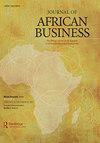Economic Institutions, Political Institutions and Renewable Energy Production in Africa
IF 1.8
Q3 BUSINESS
引用次数: 9
Abstract
ABSTRACT This study investigates the role of economic and political institutions as drivers of renewable energy production in Africa. To achieve this, the study employs panel data of 41 African countries from 2000 to 2017. To deal with endogeneity challenges associated with panel data, we use the two-step Systems Generalized Method of Moments (SGMM). Generally, we find evidence that robust economic institutions are relevant to increasing the level of renewable energy production in Africa. Second, the disaggregated measures of economic institutions show that both size of government and Freedom to trade internationally have a positive effect on renewable energy production. On the contrary, an increase in legal system and property rights reduces the level of renewable energy production. Third, the study finds that political institutions moderate the relationship between economic institutions and renewable energy production. Therefore, toward the goal of promoting SDG 12, governments in Africa should actively strengthen economic institutions to enhance responsible production of energy. However, such efforts will be much more fruitful if the level of political institutions is also strengthened.非洲的经济制度、政治制度和可再生能源生产
本研究探讨了经济和政治制度在非洲可再生能源生产中的驱动作用。为了实现这一目标,该研究采用了2000年至2017年41个非洲国家的面板数据。为了处理与面板数据相关的内生性挑战,我们使用了两步系统广义矩量法(SGMM)。总的来说,我们发现有证据表明,健全的经济制度与提高非洲可再生能源生产水平有关。其次,经济制度的分类指标表明,政府规模和国际贸易自由对可再生能源生产都有积极影响。相反,法律制度和产权的增加降低了可再生能源的生产水平。第三,研究发现政治制度调节经济制度与可再生能源生产之间的关系。因此,为了推动SDG 12的目标,非洲各国政府应积极加强经济制度,以促进负责任的能源生产。但是,如果政治机构的水平也得到加强,这种努力将更加富有成果。
本文章由计算机程序翻译,如有差异,请以英文原文为准。
求助全文
约1分钟内获得全文
求助全文
来源期刊

Journal of African Business
BUSINESS-
CiteScore
4.60
自引率
10.50%
发文量
36
期刊介绍:
Journal of African Business is the official journal of the Academy of African Business and Development, the largest network of professionals committed to advancement of business development in African nations. JAB strives to comprehensively cover all business disciplines by publishing high quality analytical, conceptual, and empirical articles that demonstrate a substantial contribution to the broad domain of African business. Regardless of the research context, tradition, approach, or philosophy, manuscripts submitted to JAB must demonstrate that the topics investigated are important to the understanding of business practices and the advancement of business knowledge in or with Africa. Particularly, JAB welcomes qualitative and quantitative research papers. JAB is not, however, limited to African-based empirical studies. It searches for various contributions, including those based on countries outside Africa that address issues relevant to African business. Targeted toward academics, policymakers, consultants, and executives, JAB features the latest theoretical developments and cutting-edge research that challenge established beliefs and paradigms and offer alternative ways to cope with the endless change in the business world. Covered areas: Accounting; Agribusiness Management and Policy; Business Law; Economics and Development Policy; Entrepreneurship and Family Business; Finance; Global Business; Human Resource Management; Information and Communications Technology (ICT); Labor Relations; Marketing; Management Information Systems (MIS); Non-Profit Management; Operations and Supply Chain Management; Organizational Behavior and Theory; Organizational Development; Service Management; Small Business Management; Social Responsibility and Ethics; Strategic Management Policy; Technology and Innovation Management; Tourism and Hospitality Management; Transportation and Logistics
 求助内容:
求助内容: 应助结果提醒方式:
应助结果提醒方式:


